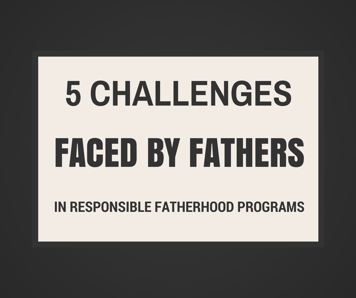5 Challenges Faced by Fathers in Responsible Fatherhood Programs
3 min read
Date Published: 04/14/2015
Last Updated: 04/14/2015
National Fatherhood Initiative Blog / Latest Articles
3 min read
What are the primary challenges of fathers who participate in responsible fatherhood programs? The Fatherhood Research and Practice Network (FRPN) recently released a brief that attempts to answer that question. (I sit on the FRPN's advisory committee.) Answering that question is critical because these challenges may be, as the brief notes, strongly associated with lower levels of father involvement in children's lives and lower quality coparenting relationships.

FRPN's Dr. Jay Fagan and Rebecca Kaufman interviewed fathers--from 9 responsible fatherhood programs in 5 cities in the northeast that serve primarily low-income, unmarried, non-residential fathers--about the challenges they face.
The top 5 challenges they mentioned in descending order of frequency were:
The other challenges they mentioned were wide-ranging, from physical health problems to their living situation preventing their children from coming to see them to drug/alcohol use to being accused of abusing/neglecting their children. (The brief includes all of the challenges the fathers mentioned, the frequency with which fathers mentioned them, and the severity of those challenges.)
These challenges underscore one of the most vital pieces of guidance National Fatherhood Initiative (NFI) has provided to organizations through the years: the importance of helping fathers meet their most immediate, pressing needs as part of or even before enrolling them in a responsible fatherhood program. Meeting these needs is often the hook that encourages fathers to enroll in a responsible fatherhood program and to maintain their participation rather than learning how to be a better father and parent (e.g. through increased knowledge of child development, child discipline, etc.). Indeed, helping fathers overcome these challenges should be a component of a responsible fatherhood program either through the provision of services (often called "wrap-around services") by the organization running the program or the organization's partners.
The FRPN's findings are similar to the results of research that I conducted with Dr. Keith Cherry, a long-time colleague and friend, when NFI was part of the National Quality Improvement Center on Non-Resident Fathers and the Child Welfare System (QIC-NRF), a 5-year project (2006-2011) funded by the Children's Bureau in the U.S. Department of Health and Human Services through a contract with the American Humane Association. That research involved interviews with low-income, non-resident fathers involved in the child welfare system in four communities supplemented by interviews with fatherhood program practitioners who worked with these and other child-welfare involved fathers.
Like the fathers interviewed by the FRPN researchers, the fathers Keith and I interviewed also mentioned financial challenges as their most pressing needs. Our research (published in the journal Protecting Children) also involved delving deeper into the impact of these fathers' challenges on the fathers and their perceptions so that child welfare workers and fatherhood practitioners within and who work with the child welfare system could better understand these fathers and, as a result, work more effectively with them and develop better strategies to encourage enrollment in fatherhood programs offered by child welfare agencies.
We recorded, transcribed, and conducted an in-depth content analysis of the interviews. We identified the following themes in the lives of these fathers:
This deep understanding of these fathers' lives is so critical to effective program delivery. Staff of responsible fatherhood programs must look not only at fathers' needs but how those needs affect fathers. It is those affects that drive fathers' behavior. Indeed, the most successful of the programs we studied during our participation in the QIC-NRF were those seen by fathers to meet fathers' needs and care about fathers' welfare.
What are you doing to understand and solve the most pressing problems of fathers?
What are you doing to better understand the impact of father absence on the fathers you serve?
Date Published: 04/14/2015
Last Updated: 04/14/2015
Download this free guide for a proven 7-step roadmap—from making the case and securing funding for your program, to launching and measuring real results!


Train Your Staff
Fatherhood Programs
Fatherhood Data
© 2026 National Fatherhood Initiative®. All rights reserved.